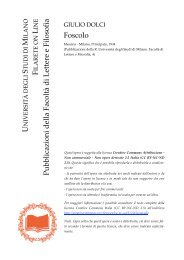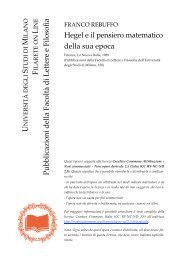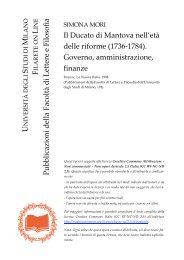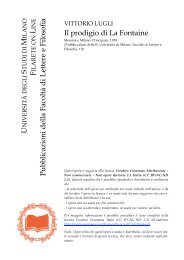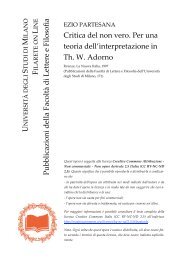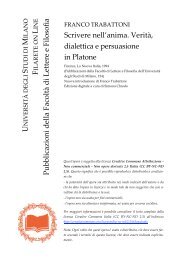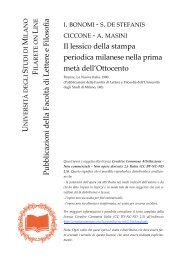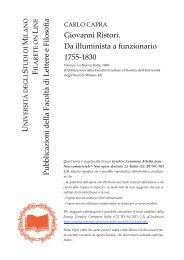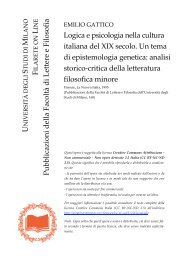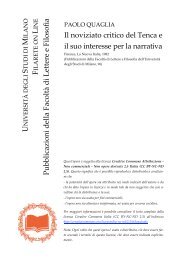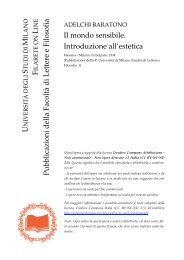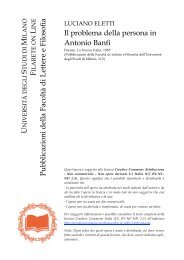Dialoghi sulla religione naturale - Studi umanistici Unimi - Università ...
Dialoghi sulla religione naturale - Studi umanistici Unimi - Università ...
Dialoghi sulla religione naturale - Studi umanistici Unimi - Università ...
Create successful ePaper yourself
Turn your PDF publications into a flip-book with our unique Google optimized e-Paper software.
DA NEWTON AL SENSO COMUNE 97<br />
mente l'idea e confutando così la sostanza stessa della filosofia del senso<br />
comune:<br />
Your Notion of correcting Subtility of Sentiment is certainly very<br />
just with regard to Morals, which depend upon Sentiment; & in<br />
Politics & naturai Philosophy, whatever Conclusion is contrary to<br />
certain Matter of Fact must certainly be wrong, and there must some<br />
Error He somewhere in thè Argument, whether we be able to show<br />
it or not. But in Metaphysics or Theology, I cannot see how either<br />
of these plain & obvious Standards of Truth can have piace. Nothing<br />
there can correct bad Reasoning but good Reasoning: and Sophistry<br />
must be oppos'd by Syllogism 10 .<br />
La lettera a Elliot precede immediatamente, almeno nell'ordine<br />
delle lettere che ci sono state conservate, la lettera del 10 marzo — a<br />
sua volta probabilmente preceduta da un'altra lettera sullo stesso argo<br />
mento —, in cui Hume commenta il « saggio » dei Dialogues inviato a<br />
Elliot. È quindi plausibile cercare un legame, sia pur indiretto, fra le due<br />
lettere e i Dialogues e una spiegazione del perché Hume era ricorso pro<br />
prio a Elliot per rafforzare il discorso di Cleante, oltre che una prova<br />
The philosophical works, ed. by T. H. Grcen and T. H. Grose, London 1882 2 ,<br />
III, p. 53.<br />
10 Letters, I, pp. 150-51. Già nel 1745, in A letter from a gentleman..., cit.,<br />
Hume, affrontando il problema dell'evidenza, si era rifatto a Tillotson per sotto<br />
lineare che « thè being of a God is not capable of Demonstration, but of moral<br />
Evidence » (p. 23). Sull'uso ambiguo del termine « sentiment » da parte di Hume,<br />
R. F. BRISSENDEN nota che Hume da una parte traccia un'esplicita distinzione fra<br />
« reasonings » e « sentiments » attribuendo i primi a un ambito logico e i secondi<br />
a un ambito pon razionale, quasi fossero sinonimi di « feelings » (cfr. per es. l'in<br />
troduzione al Treatisc o la prima sezione della seconda Enquiry. ed è in questo<br />
senso che il termine è usato anche nella lettera a Elliot) e dall'altra usa il termine<br />
« sentiment » nell'accezione ordinaria, in cui è implicito anche il significato, quasi<br />
sinonimico di « reasoning », « opinion », « thought », « judgment » (cfr. « Senti<br />
ment »: some uses of thè word in thè writings of David Hume, in <strong>Studi</strong>es in thè<br />
eighteenth century. Papers presented at thè David Nichol Smith memorial semi<br />
nar, Canberra 1966, ed. by R. F. Brissenden, Canberra 1968, pp. 89-107). Ed è<br />
appunto facendo appello al significato proprio dell'uso del termine « sentiment »<br />
nel linguaggio ordinario che Reid ha modo di sostenere che nel « sentiment » è<br />
implicito anche un giudizio razionale: « For thè word sentiment, in thè English<br />
language, never, as I conceive, signifies mere feeling, but judgment accompanied<br />
by feeling » (Essays on thè active powers of man, in Philosophical works, with<br />
notes and supplementary dissertations by Sir W. Hamilton, 2 vols, Edinburgh 1895,<br />
essay V, eh. VII, II, p. 674). Sull'uso nel '700 inglese del termine « sentiment »,<br />
vedi S. I. TUCKER, Protean shapc. A study in eighlecnth-century vocabulary and<br />
usage, London 1967, pp. 247-51.



